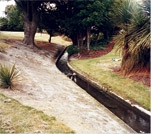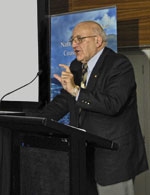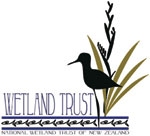PDF of this article (105 KB)

Knowledge for customary coastal and kaimoana management

| Toitū te Marae o Tane | Protect and strengthen the realms of the Land |
| Toitū te Marae o Tangaroa | Protect and strengthen the realms of the Sea |
| Toitū te Iwi | and they will protect and strengthen the People |
NIWA’s workshop on customary coastal and kaimoana management was sponsored by the National Centre for Coasts and Oceans, the National Centre for Fisheries and Aquaculture, and Te Kūwaha o Taihoro Nukurangi, NIWA’ Māori Research and Development group. Held at Te Papa in June, the two-day meeting brought together over 100 participants, including kaitiaki, iwi authorities, Te Ohu Kaimoana, scientists, and staff from central and local government agencies.
Māori are increasingly faced with complex customary fisheries management issues and responsibilities. This workshop offered an important opportunity to connect and to share information on issues and potential solutions.
Sir Tipene O’Regan was a thought-provoking keynote speaker. He emphasised that customary rights are relational, shaped by custom and whakapapa, which give the right of local use and management. He stressed the importance for Māori to collectively engage with each other, decision-makers, and scientists, so as to debate from an informed position to achieve desired customary fisheries outcomes.
Other speakers from central and local government highlighted customary and coastal marine regulatory aspects, including their implications and opportunities. Māori representatives from Te Ātiawa Manawhenua Ki Te Tau Ihu Trust, Te Kūpenga Whiturauroa a Māui Regional Forum, Mana Whenua Reference Group, Ngāti Tama, Te Rūnanga o Moeraki, and Te Rūnanga o Ngāti Awa shared their customary values, research, and management experience.
The second day featured presentations on the biology and ecology of coastal kaimoana, and importance of resource assessments and time-based studies for fisheries management. The speakers highlighted the benefits of sharing local ecological and scientific knowledge to further management goals.
The workshop presentations are available from: www.niwascience.co.nz/ncco/workshops/customary_workshop
For further information, contact: Dr Ian Wright Kelly May, 04-386 0361, [email protected]
Wai Wetlands?

The 2008 Wetland Symposium is a joint venture between the National Wetland Trust, NIWA, University of Canterbury, Christchurch City Council, Environment Canterbury, Ngāi Tahu, Department of Conservation, Landcare Research, and Fish & Game.
Wai Wetlands? will be held in Christchurch at the University of Canterbury, 14-16 February 2008.This will be the third symposium (after Wellington in 2004 and Hamilton in 2006), and the first to be held in the South Island.
The aim of the symposium is to provide a highly practical, participant-driven forum for knowledge exchange, training, and networking for people from all over New Zealand: landowners, iwi, people committed to wetland biodiversity and restoration, policy makers, and wetland scientists. The programme caters for all, and includes plenary, technical, soapbox, and practical sessions, along with one-day and half-day fieldtrips. There will also be practical training on site, as well as environmental education.
A call for presentations will go out in September 2007.
For further information, contact: Dr Catherine Chagué-Goff, 03-343 7845, [email protected]
or visit the National Wetland Trust website: www.wetlandtrust.org.nz
Water resources: information challenges in a changing environment
New Zealand faces increasing challenges in water resource management. Our ability to manage our fresh water sustainably is constrained by:
- changes in water availability through climate variation
- increasing demands for water to drive economic growth
- growing public concern with water quality and equitable allocation.
In June, NIWA’s National Centre for Water Resources and National Climate Centre sponsored a two-day workshop at Te Papa for those grappling with water resource management. On the agenda was identifying issues that challenge sustainable resource use and where science can help support management of fresh water, now and in the future.
Twenty-five invited speakers provided an excellent overview of industry and other stakeholder perspectives, resource management, and water resource science. They identified key issues, including lack of catchment-scale perspectives in water resource management, the need for integration of water quantity and quality issues when making management decisions, and limitations of the current management framework when water resources become fully allocated, as is happening increasingly in drier parts of the country.
A summary of discussions and presentations by invited speakers is available from the National Centre for Water Resources: www.niwascience.ncwr/news/workshop_07
For further information, contact: Dr Mike Scarsbrook
